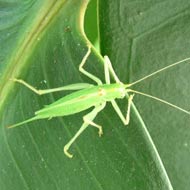Insects 'could offer an alternative protein source'

Alternatives protein sources include bacteria, micro algae, seaweed, lab-grown meat and insects.
Insects could offer a solution to rising demand for meat, offering a more environmentally friendly alternative, according to a new report by the UK Government's waste agency.
Global meat consumption is set to rise by 76 per cent by 2050, but livestock production generates greenhouse gas emissions and requires large quantities of water and 33 per cent of global arable land for feed.
The Waste and Resources Action Programme (Wrap) says alternative sources of protein must be found for both livestock feed and human consumption.
Suggested alternatives include bacteria, micro algae, seaweed and lab-grown meat, as well as insects.
Lab-grown meat potentially uses 45 per cent less energy, 96 per cent fewer greenhouse gas emissions and requires 99 per cent less land than the average for farmed beef.
The first lab-grown hamburger was made in 2013, having taken two years to produce and costing £200,000. Yet Wrap's report says ground beef, pork and sausage may be possible on a production scale in five to 10 years.
Insects, meanwhile, require less land use and potentially result in fewer greenhouse gas emissions. In addition, up to 80 per cent of the bodyweight is edible and digestible, compared to 55 per cent of chicken and 40 per cent of cattle.
But, in order to see a real growth in these alternatives, consumer attitudes must change, the report adds. In the west there is typically a 'yuck factor' for many of these, such as insects, while many feel lab-grown meat is 'unnatural'.
Developing these alternatives is also dependent on proving food safety, production costs, nutrition and scalability.
To read the Food Futures report in full, visit: http://www.wrap.org.uk/content/food-futures



 The Veterinary Medicines Directorate (VMD) is inviting applications from veterinary students to attend a one-week extramural studies (EMS) placement in July 2026.
The Veterinary Medicines Directorate (VMD) is inviting applications from veterinary students to attend a one-week extramural studies (EMS) placement in July 2026.